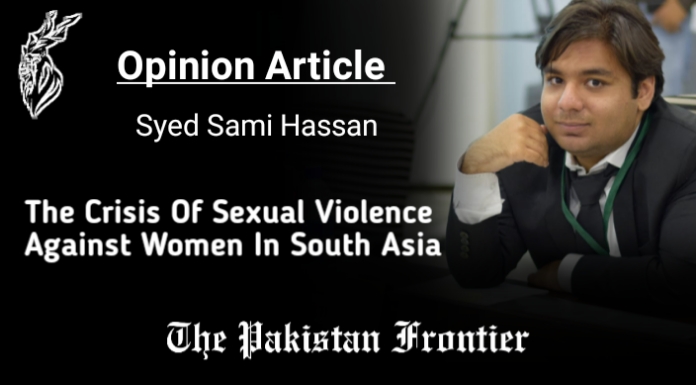The brutal rape and murder of a trainee doctor Dr. Moumita Debnath at R.G.Kar Medical College on 9 August,2024 has understandably provoked anger and calls for justice in India. Debnath’s murder details are gory her body was discovered in a seminar hall on her medical campus, she had been sexually assaulted and strangled -has become symbolic of the widespread violence women endure not only in India but throughout South Asia.
The horror that Debnath faced, and the first attempt by college authorities at portraying it as suicide is a definitive symbol of an ecosystem where attack on women appear to be naturalised while justice takes longer or gets completely trampled upon.
But Debnath’s tragedy isn’t unique, nor is it limited to India. In neighbouring Pakistan, the lives of women and girls are not less traumatic. In South Asia, patriarchy and a weak justice system enables rape culture to fester; sexual & gender-based violence is so entrenched in society.
The Case of Pakistan- Disturbing Parallels
Recent data from Pakistan shows an even uglier picture. A report from the advocacy group War Against Rape (WAR) states that 21,900 women have been raped in Punjab province alone from 2017 to 2021, or on average a dozen every day. These figures, however troubling are meant to be only the tip of the iceberg. Systemic biases, victim-blaming and social stigma keep many survivors from speaking.Compounding Pakistan’s existing rape culture is a legal framework insufficient for the protection of women and children. Despite laws such as the Pakistan Penal Code and Anti-Rape Act, sexual violence against women stays rampant. The prosecution is an exception, and conviction rates are dismally low. Victims’ families are often coerced into an out of court settlement by socioeconomic factors; the perpetrator walks free to victimize others.
Also, the WAR report reveals a frightening fact in Karachi as 85pc of sexual violence victims were women and girl children. At least two-thirds of victims were minors, and a total 66 cases of sexual violence was recorded from July 2022 until June this year. Too many kids didn’t just get raped, they were murdered afterward. These crimes are savage enough without this outcome being the norm. This disturbing data mirrors what happened to Moumita Debnath in India.
Rape Culture in South Asia
Rape culture- a phrase used to describe an environment where rape is prevalent as well as excused, is endemic in South Asia. They are products of a long history of patriarchy that has for centuries seen women as inferior humans and their bodies as properties belonging to men. Despite rape being a tool of power in both India and Pakistan, survivors are often disbelieved or blamed for their own abuse.It shows not just the scale of the problem — with an average 12 women raped every day in Punjab alone, according to officials — but also that Pakistan’s justice system has failed. Most of the cases go unreported due to social stigma and fear of retaliation, and for those who are brave enough to speak out, the legal process is tedious marked by impediments. In one instance cited by the NGO Sahil, this violence was so rampant it meant that a child had been subjected to sexual abuse every two hours during the first six months of 2023 — highlighting how even society’s youngest are not protected from this type of social hell.Women and children may have laws and policies in their favor but their protection is most dismal. And across the region, from Karachi to Kolkata, survivors often find themselves without institutional support in their struggle for justice. Indeed, it is the lack of serious action against sexual violence — its root causes in misogyny, toxic masculinity and whore-shaming have only gained further freedom over recent decades — that has made these abhorrent acts continue unpunished.
The Path Forward
Ending the cycle of violence will depend on whether South Asian societies are prepared to confront the culture and structure underpinning sexual violence. Condemning individual incidents, whether the rape and murder of Moumita Debnath or some other has long been a partisanship. There should be a reboot in the way women are prioritized when it comes to safety about public as well private spaces.The justice systems in India and Pakistan need to be empowered, so that survivors can access prompt and considerate legal remedy. That means doing things like increasing the recruitment and training of female police officers, as well as establishing specialized units responsible strictly for addressing gender-based violence. There should also be strong educational initiatives to fight misogyny and promote gender equality from the very beginning.There can be no more ignoring the horrific ongoing abuse of South Asias women and children. There is widespread outrage globally after what happened in India and Pakistan, but this should be the case for governments and civil societies across the region. Unless victims like Moumita Debnath get justice soon, the region will normalize violence against women as their permanent social order.Time to say no: to rape culture, wherever it is. A woman anywhere, whether brazenly or modestly wearing clothes in Kolkata as they do on the streets of Karachi; a seminar hall; her own home should never have to be afraid — even sense danger. We owe it to the women of South Asia to create a world where they are free and their lives, rights, and dignity is respected.
Conclusion
The growing voices seeking justice for Moumita Debnath resonate with the megaphone-like screams of thousands other women in South Asia. They urge us to face the stark truth that women’s safety remains a commodity in many corners of our planet. However, the time for complacency has passed. But the stories of India and Pakistan — separated by international borders but bound in agonized silence and suffering reflect hauntingly familiar tales of impunity. Now is the time to shatter that silence and ensure justice for everyone.
